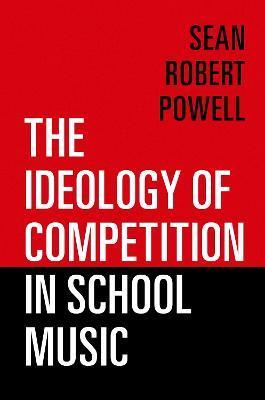The Ideology of Competition in School Music

The Ideology of Competition in School Music
The Ideology of Competition in School Music explores competition as a structuring force in school music and provides critiques of that system from multiple philosophical and theoretical perspectives. Competition is seen by many music teachers, students, and supporters as natural and inevitable--a taken-for-granted aspect of music education or an irresistible force, rather than a choice. This book uncovers this ideological nature of competition and examines its effect on student learning, teacher agency, and equity within music education. It considers ways in which music educators might reconsider the role of competition in their teaching practice and offers alternative frameworks for organizing school music. In this book, author Sean Robert Powell views competition as a microcosm of the wider neoliberal capitalist society, in which subjects are interpellated in an antagonistic competitive field as market logic dictates a system of accountability, reduction, and audit culture. Music teachers, students, and education administrators, consciously and unconsciously, reinforce, replicate, and sustain the competitive structure, even if they do so while expressing a cynical disavowal. Powell considers competition broadly, including, for example: formal competitions between schools in which ensembles are given numerical scores and ranked; "festivals" in which groups are given ratings based on pre-given criteria; state, regional, and national honor ensembles; hierarchical arrangements within school music programs; or simply the pursuit of social prestige, reputation, and ever-higher performance standards. Although the book provides examples from the competitive landscape of school music in the
United States (and, especially, Texas, considered a "hyper" example of competitive culture), Powell's analyses and discussions are relevant to readers in any context around the world. Although the degree to which competitive achievement as an explicitly-stated aim of instruction varies from program to program and location to location, the "realism" of neoliberal capitalism--and its effect on all aspects of education--is a global phenomenon.
242.15Lei
242.15Lei
Livrare in 2-4 saptamani
Descrierea produsului
The Ideology of Competition in School Music explores competition as a structuring force in school music and provides critiques of that system from multiple philosophical and theoretical perspectives. Competition is seen by many music teachers, students, and supporters as natural and inevitable--a taken-for-granted aspect of music education or an irresistible force, rather than a choice. This book uncovers this ideological nature of competition and examines its effect on student learning, teacher agency, and equity within music education. It considers ways in which music educators might reconsider the role of competition in their teaching practice and offers alternative frameworks for organizing school music. In this book, author Sean Robert Powell views competition as a microcosm of the wider neoliberal capitalist society, in which subjects are interpellated in an antagonistic competitive field as market logic dictates a system of accountability, reduction, and audit culture. Music teachers, students, and education administrators, consciously and unconsciously, reinforce, replicate, and sustain the competitive structure, even if they do so while expressing a cynical disavowal. Powell considers competition broadly, including, for example: formal competitions between schools in which ensembles are given numerical scores and ranked; "festivals" in which groups are given ratings based on pre-given criteria; state, regional, and national honor ensembles; hierarchical arrangements within school music programs; or simply the pursuit of social prestige, reputation, and ever-higher performance standards. Although the book provides examples from the competitive landscape of school music in the
United States (and, especially, Texas, considered a "hyper" example of competitive culture), Powell's analyses and discussions are relevant to readers in any context around the world. Although the degree to which competitive achievement as an explicitly-stated aim of instruction varies from program to program and location to location, the "realism" of neoliberal capitalism--and its effect on all aspects of education--is a global phenomenon.
Detaliile produsului










